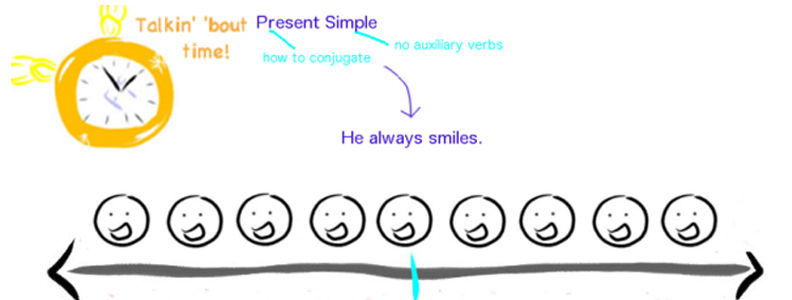Simple Present Verb Tense
Let’s talk about the simple present verb tense. Verb tenses indicate the time of an action, condition or event. This is done by changing the form of the verb. The verb tenses may be categorized according to the time frame: past tenses, present tenses, and future tenses. Let’s break these tenses down even further, beginning with the present tense: simple present
 simple present
simple present
verb + s/es in the third person
The simple present, or present simple tense, is used to express the idea that an action is repeated or usual. The action can be a habit, a hobby, a daily event, a scheduled event or something that often happens. It can also be something a person often forgets or usually does not do.
The simple present is used to express the idea that an action is happening or is not happening now I am here now. Simple present is also used with scheduled events in the near future:
“The boat leaves tomorrow at 6 am.”
The simple present can also indicate the speaker believes that a fact was true before, is true now, and will be true in the future. (It doesn’t necessarily need to be true!) It is also used to make generalizations about people or things:
“Cats like milk. Miami is in Florida.”
Simple present can be used to express the idea that an action is repeated. The action can be a habit, a hobby, a daily event, a scheduled event or something that often happens. It can also be something a person often forgets or usually does not do:
“I play volleyball. She does not play volleyball.”
With simple present tense, we often use time expressions such as always, often, sometimes, usually, seldom, never, only, on Wednesdays, lately, etc.:
“You only speak English.” “Do you only speak English?”
The simple present, or present simple tense, is used to express the idea that an action is repeated or usual. The action can be a habit, a hobby, a daily event, a scheduled event or something that often happens. In the other English lessons on verbs, these different kinds of verb tenses and their functions will be discussed.



















